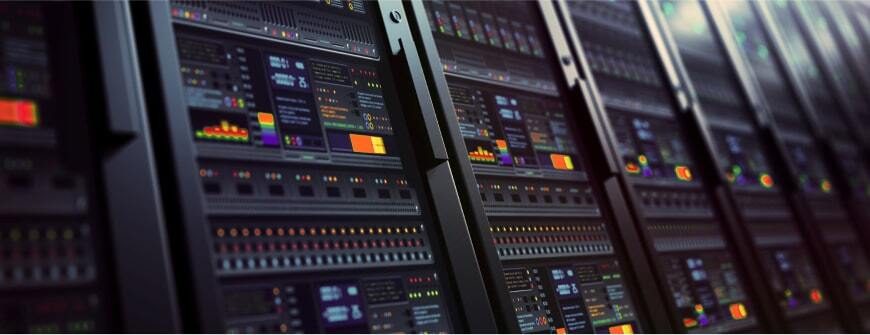A tower server looks similar to a desktop computer that has a standard size case. The first servers used in small to midsize organizations were tower servers. They use a standard computer case with high-end components in the tower. Building a tower server is somewhat the same as building a standard desktop computer, but it requires advanced components that can handle higher CPU and network loads with more storage.
What Is a Tower Server?
Servers are centralized computers that handle many network environment processes. You might have several servers to handle different aspects of your business. For example, you might have an FTP server, a file storage server, an application server, and an email server. For each separate machine, you might have a tower server. Tower servers aren’t your only option, but some small and midsize companies opt to use them.
What are the Components of a Tower Server?
Any component in a standard desktop computer is used in a tower server. The main difference is that the computing resources are much more advanced. Usually, a tower server has the latest generation of most components, especially the CPU, memory, and video card. The network card must also be able to handle high-volume traffic. Some tower servers have two network cards to perform routing and other network services.
Other components in a tower server include a motherboard, a video card, a power supply that provides enough power to the machine, and other miscellaneous parts, such as fans, the case, and peripherals. If you have multiple tower servers, you can use a switch box to connect a mouse, keyboard, and monitor to multiple towers. The switch connects to all towers and you can switch peripherals to the active tower using the switch box.
How Does a Tower Server Work?
A tower server works in the same way as any other server, but it’s built differently. The way a tower server functions depends on its purpose. If you have one tower server used as a file server, it connects to the network with large storage capacity. In this scenario, the tower server has several drives available for space, and administrators configure it to allow authorized users to connect to respective authorized directories.
A tower server can act as any other type of server on the network. It can act as a central server for authorization and authentication for the network. Active Directory might run on your server to handle permissions for the environment. You might use a tower server as a database server where it will store data for your applications. In other scenarios, an organization might use a server as an application server where it will store executable files users access to run business software.
Reasons to Use a Tower Server
For small or midsize businesses, a tower server could be the perfect solution to support several network resources. A tower server is completely customizable to your own computing power requirements. If you have a small business, you could start with a tower server to support applications, file storage, and various other network resources, such as DHCP and DNS.
Using a tower server instead of a blade or rack server, for example, comes with several benefits. The first is that they’re simpler to house and maintain. Anyone familiar with a standard desktop computer can maintain a tower as long as they understand the additional networking features hosted on the server (e.g., DHCP services and Active Directory).
Another benefit is that they’re completely molded to your requirements. If you want to upgrade a tower, you can add a component if the motherboard has an additional slot for expansion boards. You can build your own tower server from scratch or order a server from a preferred vendor to reduce the time it takes to provision and install a tower server.
Depending on the quality of fans and the case, a tower server is typically quiet. Rack servers, on the other hand, are loud, especially if there are several in one location. Tower servers with high-end fans won’t make any noise, which will work well for small businesses that don’t have a dedicated space for servers and network equipment.
Reasons Not to Use a Tower Server
Tower servers aren’t the best choice for every organization. For larger organizations that have limited space, it can be challenging to fit several towers in a network closet because they’re so big. Also, when you have several tower servers, cable organization can be difficult to control. In contrast, rack servers and the chassis that support them are built for cable organization.
Large enterprises should consider building rack or blade servers into their infrastructure because they’re more compact and built for cable organization. A large enterprise will likely need more than one server, so starting out with rack servers will ensure that you have room to fit more servers as the network expands. Just remember that the more servers you add to the rack, the more cooling you’ll need to remove the heat created by multiple rack or tower servers.
Conclusion
If you own a small business, a tower server might be a more convenient way to start building your network environment. As your environment grows, you might find that tower servers take up too much space and aren’t as scalable as rack servers. Keep this in mind if you buy several tower servers to support your network environment and employee productivity. Eventually, you may prefer to build rack servers into your network infrastructure, or you might find that using cloud servers is more convenient and beneficial for your business.




